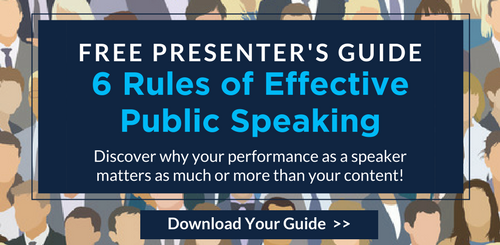 You have to display presence right way for people to have faith in you. First impressions matter, so here's how to power up to create a lasting one.
You have to display presence right way for people to have faith in you. First impressions matter, so here's how to power up to create a lasting one.
The humorist Will Rogers famously said that you never have a second chance to make a first impression. These days, you have to do so faster than ever before.
With our brains re-wiring to the synapses of cyber-speed, even a one-minute elevator speech feels like a slow ride. In the 21st-century, your visual, vocal, and cognitive impact has to be immediate.
Are you ready to take the fast track to get there?
Do you know the most important parts of your speeches and presentations? It's your opening and closing. What your audience thinks about you right away colors their judgment and opinion of you. So you need to hit the ground running! Discover how to establish rapport and gain influence fast. Download my free Insights article, "Great Speaking? — It's About Performance Over Content!"
Here are three tools to create a personal and professional impact that presents you at your best—and equally important—that lasts.
 The Visual You: The Powerful First Impression
The Visual You: The Powerful First Impression
Who can deny that we size people up in all kinds of ways simply from what they look like? Whether our initial impressions will prove to be true or false is a determination yet to come. For now, we believe that what we see is what we'll get.
So, are you helping or hurting your cause? Culture plays out strongly here, of course—in the sense of everything from ethnic and geographical differences to office norms. Interestingly, the way you present yourself strongly influences your own self-confidence, which then plays out in terms of what others . . . see. When it comes to body language and dealing with speech anxiety, for instance, adapting strong behaviors can create a positive loop that travels from others right back to you: "You look confident, therefore I'll believe in you, and when you yourself see that, you'll grow more confident!"
One way this plays out is through our clothing. We all know that when we dress to impress, we feel the effect ourselves. Research conducted in 2015 bears this out. A study showed that people wearing formal clothes had higher “action identification,” i.e., they were better able to understand their actions and its effects.[1] In other words, they had a greater sense of agency and therefore power. If you dress well and work on the physical aspects of your posture, carriage, ease and rhythm of movement, strong handshake, etc., you'll be taking full advantage of the enormous power of the visual on those you deal with.

Eye Contact and Listening: How to Be Present
You've heard of the importance of eye contact in connecting with and influencing others. In anthropologist Edward Hall's concept of "low-context cultures" (like ours), where comprehension depends on what is actually taking place, signals during an interaction become all-important. In the West, at least, establishing strong eye contact means involvement and trustworthiness, while avoiding looking at others means the opposite.
As I tell audiences: Do you generally believe someone who won't look you in the eye? It's true that we look away more in a conversation when we're speaking than when we're listening. If you're like most people, then, work on increasing your eye contact when you're the one talking.
And listen! Most of us have poor listening skills (ask your significant other). When we patiently wait to hear all of what's being said before we mentally start to answer, we hear more accurately what the person is actually saying. And summarizing what you've heard is always helpful: "So, what I think you're saying is . . . " Good eye contact and superior listening skills create a strong impression and, incidentally, will place you in a treasured minority.

Your Vocal Impact: When the Voice Rules
Finally, your voice is a powerful and efficient resource in terms of influencing how others think and feel about you. Confidence, authority, warmth and empathy, liveliness, trustworthiness, patience and interest in others—these are the attributes (or their opposities) people hear just from the sound of your voice. And that's not to mention the sheer pleasure we gain in hearing some voices. Do you like listening to Morgan Freeman?
Recently, a company hired me to train its employees in improving vocal skills on the phone. Much of that firm's business is conducted in conference calls with clients, and the leadership team recognized the importance of voice in these interactions. It's true that visuals tend to dominate in-person interactions. But take away those visuals, as in a phone conversation or conference call, and the importance of your vocal skills mushrooms. At these times, you are only a vocal persona. If you're not strong in this area, it's time for voice and speech improvement.
An amazing study conducted recently demonstrates the importance of the voice in providing an impression of a speaker, in this case projecting emotions. In a series of five experiments involving 1,800 participants interacting with others, results showed that listening alone—even more strongly than watching and listening—allows people to read another's emotions more accurately.[2] And you may not even need to worry too much about how to stop saying 'uh' and 'um.' Some linguists even believe that vocal fillers like these have meaning, as they signal that a gap only represents a delay in what the speaker is saying, not a cue to jump in.[3]
So there's your trifecta for creating a great first impression: Pay attention to the visual you, maximize eye contact and listening skills, and leverage the power of your voice. And what about making your impact a lasting one? Simply follow up with all those other things you had going for you all along.
You should follow me on Twitter here.
Great speakers know how to engage and move audiences! Do you practice those skills in your own public speaking? Learn how in my free presenter's guide, "The Six Rules of Effective Public Speaking."
[1] Michael L. Slepian, Simon N. Ferber, Joshua M. Gold, and Abraham M. Rutchick. "The Cognitive Consequences of Formal Clothing." Social Psychological and Personality Science, August 2015, vol. 6, no. 6, 661-668.
[2] Michael Kraus, “Voice-Only Communication Enhances Empathic Accuracy.” American Psychologist, published online Oct. 10, 2017. https://www.apa.org/news/press/releases/2017/10/emotions-listen.aspx
[3] http://abcnews.go.com/Technology/story?id=97983&page=1



